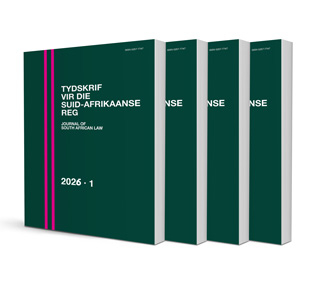Collective bargaining in the gig economy: a comparative analysis

ARTIKEL
Collective bargaining in the gig economy: a comparative analysis
Authors: Betina Fleming and Marthinus van Staden
ISSN: 1996-2207
Affiliations: Director: Employee Relations; University of the Witwatersrand; Associate Professor; Wits School of Law
Source: Tydskrif vir die Suid-Afrikaanse Reg, Issue 1, 2026, p. 117-142
https://doi.org/10.47348/TSAR/2026/i1a7
Abstract
In hierdie artikel ondersoek die outeurs die evolusie en toepassing van kollektiewe bedingingsregte binne die gig-ekonomie deur middel van ’n vergelykende analise van vyf jurisdiksies: Brasilië, China, Indië, Kenia en Suid-Afrika. Die studie ondersoek hoe tradisionele arbeidsregsraamwerke, histories ontwerp rondom standaard diensverhoudinge, nie pas hou met die realiteite van platformgebaseerde werk en die uitdagings wat dit vir werkers wat kollektiewe verteenwoordiging soek, inhou.
Die studie begin deur die Internasionale Arbeidsorganisasie se normatiewe raamwerk te ondersoek, wat kollektiewe bedinging as fundamenteel vir die bereiking van ordentlike werk vestig. Ten spyte van die organisasie se inklusiewe visie wat hierdie regte uitbrei na alle werkers ongeag hul indiensnemingstatus, toon die analise beduidende implementeringsgapings in die ondersoekte jurisdiksies. Die sentrale struikelblok wat geïdentifiseer is, is die sistematiese wanklassifikasie van platformwerkers as onafhanklike kontrakteurs eerder as werknemers, wat hulle effektief uitsluit van tradisionele kollektiewe bedingingsmeganismes. Die artikel identifiseer verskeie algemene hindernisse vir kollektiewe organisering in die gig-ekonomie. Dit sluit in regsuitsluitings wat voortspruit uit verouderde indiensnemingsdefinisies, strukturele fragmentasie van die werksmag wat solidariteit belemmer, algoritmiese beheerstelsels wat toesig en werksonsekerheid skep en platformweerstand teen werkersorganisasie. Die gedesentraliseerde aard van platformwerk, gekombineer met werkers se vrese vir vergelding deur rekeningdeaktivering of verminderde werktoewysing, skep afskrikwekkende effekte op kollektiewe optrede. In al vyf lande, het platformwerkers merkwaardige innovasie getoon in die organisering van pogings, die gebruik van sosiale medianetwerke, die vorming van werkerskoöperasies en die deelname aan spontane kollektiewe aksies. Hierdie grondvlak-inisiatiewe bly egter regsonerkenbaar en struktureel kwesbaar. Dit funksioneer buite formele raamwerke vir arbeidsverhoudinge.
Die vergelykende analise toon dat, ten spyte van verskillende regs- en politieke kontekste, alle jurisdiksies nie daarin slaag om kollektiewe bedingingsregte voldoende uit te brei na platformwerkers nie. Dit skep ’n groeiende groep ekonomies afhanklike werkers wat regsonsigbaar bly en uitgesluit word van fundamentele arbeidsbeskerming. Daar word bevind dat die bereiking van betekenisvolle kollektiewe bedinging in die digitale ekonomie fundamentele regshervorming vereis. Arbeidsreg moet verder as tradisionele indiensnemingsbinariteite ontwikkel om funksionele benaderings te omhels wat diverse arbeidsreëlings erken. Sonder sodanige transformasie sal die fundamentele beginsels van vryheid van assosiasie en ordentlike werk vir platformwerkers onverwesenlik bly, wat demokratiese arbeidsverhoudinge in die digitale era ondermyn.